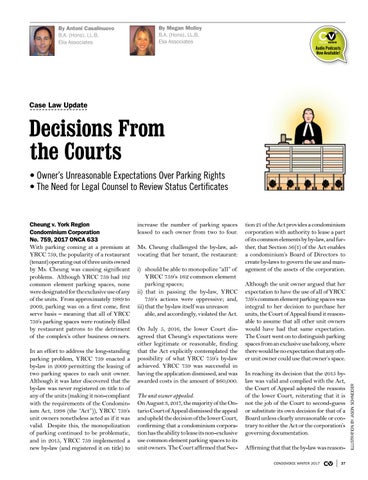By Antoni Casalinuovo B.A. (Hons), LL.B. Elia Associates
By Megan Molloy B.A. (Hons), LL.B. Elia Associates
+
CV
condovoice
Audio Podcasts Now Available!
Case Law Update
Decisions From the Courts • Owner’s Unreasonable Expectations Over Parking Rights • The Need for Legal Counsel to Review Status Certificates
In an effort to address the long-standing parking problem, YRCC 759 enacted a by-law in 2009 permitting the leasing of two parking spaces to each unit owner. Although it was later discovered that the by-law was never registered on title to of any of the units (making it non-compliant with the requirements of the Condominium Act, 1998 (the “Act”)), YRCC 759’s unit owners nonetheless acted as if it was valid. Despite this, the monopolization of parking continued to be problematic, and in 2015, YRCC 759 implemented a new by-law (and registered it on title) to
increase the number of parking spaces leased to each owner from two to four. Ms. Cheung challenged the by-law, advocating that her tenant, the restaurant: i) should be able to monopolize “all” of YRCC 759’s 162 common element parking spaces; ii) that in passing the by-law, YRCC 759’s actions were oppressive; and, iii) that the by-law itself was unreason able, and accordingly, violated the Act. On July 5, 2016, the lower Court disagreed that Cheung’s expectations were either legitimate or reasonable, finding that the Act explicitly contemplated the possibility of what YRCC 759’s by-law achieved. YRCC 759 was successful in having the application dismissed, and was awarded costs in the amount of $60,000. The unit owner appealed. On August 3, 2017, the majority of the Ontario Court of Appeal dismissed the appeal and upheld the decision of the lower Court, confirming that a condominium corporation has the ability to lease its non-exclusive use common element parking spaces to its unit owners. The Court affirmed that Sec-
tion 21 of the Act provides a condominium corporation with authority to lease a part of its common elements by by-law, and further, that Section 56(1) of the Act enables a condominium’s Board of Directors to create by-laws to govern the use and management of the assets of the corporation. Although the unit owner argued that her expectation to have the use of all of YRCC 759’s common element parking spaces was integral to her decision to purchase her units, the Court of Appeal found it reasonable to assume that all other unit owners would have had that same expectation. The Court went on to distinguish parking spaces from an exclusive use balcony, where there would be no expectation that any other unit owner could use that owner’s space. In reaching its decision that the 2015 bylaw was valid and complied with the Act, the Court of Appeal adopted the reasons of the lower Court, reiterating that it is not the job of the Court to second-guess or substitute its own decision for that of a Board unless clearly unreasonable or contrary to either the Act or the corporation’s governing documentation. Affirming that that the by-law was reasonCONDOVOICE WINTER 2017
CV
37
ILLUSTRATION BY JASON SCHNEIDER
Cheung v. York Region Condominium Corporation No. 759, 2017 ONCA 633 With parking coming at a premium at YRCC 759, the popularity of a restaurant (tenant) operating out of three units owned by Ms. Cheung was causing significant problems. Although YRCC 759 had 162 common element parking spaces, none were designated for the exclusive use of any of the units. From approximately 1989 to 2009, parking was on a first come, first serve basis – meaning that all of YRCC 759’s parking spaces were routinely filled by restaurant patrons to the detriment of the complex’s other business owners.
